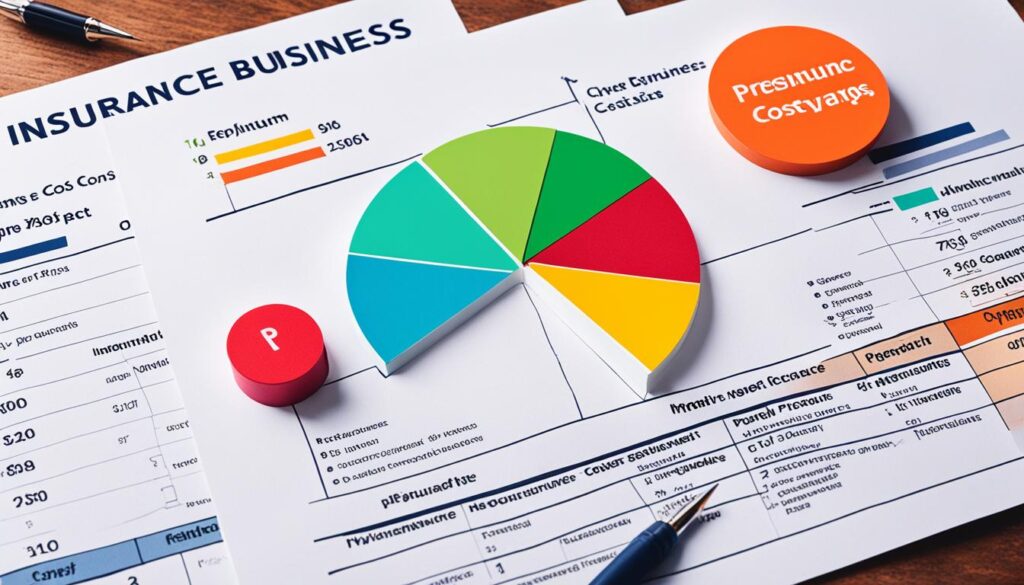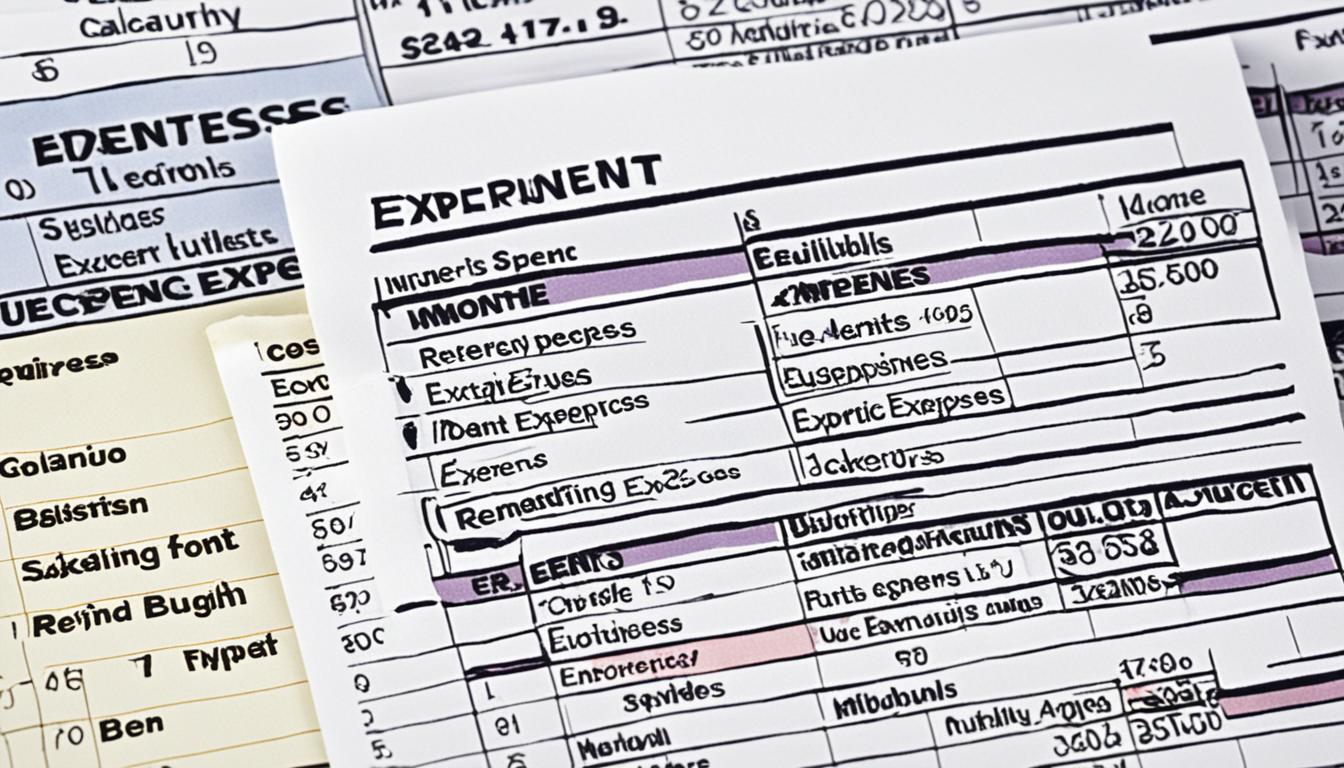Did you know that managing the monthly costs of running a business is crucial for its financial stability and success? From equipment expenses to insurance premiums, there are various financial obligations that business owners must consider. Understanding and budgeting for these costs is essential to ensure that your business can thrive and grow. Let’s explore the breakdown of monthly business expenses and discover strategies for effective budgeting and financial planning.
Key Takeaways:
- Running a business entails both one-time and recurring expenses.
- Equipment expenses can vary depending on the nature of the business.
- Incorporation fees and business licenses should be factored into the budget.
- Insurance premiums provide financial protection and vary based on factors such as industry and location.
- Budgeting and financial planning are crucial for managing monthly business costs.
Equipment Expenses
When starting a business, one must consider the various expenses involved, including equipment costs. Equipment expenses encompass the necessary tools and machinery needed to operate the business efficiently. While some businesses require minimal equipment, others may have more complex needs.
For instance, a writer may only require a laptop and printer to carry out their work effectively, while a videographer would need cameras, lenses, lighting equipment, and a tripod to produce high-quality videos.
It is important to carefully assess the specific equipment needs based on the nature of the business. This will help determine the upfront costs and ongoing expenses associated with acquiring or leasing equipment.
Equipment expenses can be categorized as one-time costs or recurring monthly payments. In the case of purchasing equipment outright, it is considered a one-time cost that is factored into the business startup expenses. Alternatively, businesses may choose to lease equipment, resulting in monthly payments that need to be budgeted accordingly.
By understanding the specific equipment requirements and considering the financial implications, business owners can make informed decisions about their equipment expenses and manage their budget effectively.
Examples of Business Equipment and Costs
Here are some examples of common business equipment and their associated costs:
| Equipment | Cost Range |
|---|---|
| Laptop | $800 – $2,000 |
| Desktop Computer | $1,000 – $3,000 |
| Printer | $100 – $500 |
| Camera | $500 – $5,000 |
| Lenses | $200 – $2,000 |
| Lighting Equipment | $100 – $1,000 |
| Tripod | $50 – $300 |
These cost ranges are approximate and can vary depending on factors such as brand, quality, and specific business needs. It is recommended to research and compare prices from different suppliers to get the best value for money.
Leasing Equipment
In some cases, businesses may opt to lease equipment instead of purchasing it outright. Leasing can provide advantages such as lower upfront costs, flexibility to upgrade equipment, and potential tax benefits.
When leasing equipment, rather than buying it, businesses will have monthly equipment payments as an ongoing expense. It is crucial to understand the terms of the lease agreement, including the duration, monthly payment amount, and any additional fees or penalties.
Here are a few examples of equipment leasing costs:
| Equipment | Monthly Lease Cost |
|---|---|
| Laptop | $50 – $150 |
| Printer | $20 – $50 |
| Camera | $100 – $300 |
Leasing equipment can be a viable option for businesses that prefer to conserve capital upfront or require access to the latest technology without the need for long-term ownership.
Overall, carefully considering equipment needs and their associated costs is vital for business owners. Whether deciding to purchase or lease equipment, budgeting for these expenses is essential to ensure financial stability and successful operations.
Incorporation Fees
Incorporation is a crucial step in forming a company or corporate entity. It offers several advantages, including tax benefits and liability protection. However, it’s important to note that incorporation also comes with costs. These expenses vary depending on the jurisdiction and may require the services of a lawyer.
When budgeting for your business, it is essential to factor in incorporation fees. This will ensure that you have a realistic understanding of the financial obligations associated with forming a company. It is recommended to consult with a legal professional to understand the specific fees and requirements in your jurisdiction.
Business Licenses
In addition to incorporation fees, business licenses are often required to operate legally. These licenses serve as official permits that grant businesses the authority to conduct specific activities within a particular geographic area.
The cost and requirements for business licenses vary depending on the location, industry, and type of business. It is essential to research and understand the licensing obligations in your jurisdiction. Failure to obtain the necessary licenses can result in legal consequences and financial penalties.
Furthermore, it’s important to note that business licenses often need to be renewed annually. This ensures that businesses continue to comply with any regulatory changes and remain in good standing. It is advisable to keep track of license expiry dates and initiate the renewal process in a timely manner.
By incorporating your business and obtaining the required licenses, you can establish a solid legal foundation and ensure compliance with local regulations. This not only protects your business but also instills trust and confidence in your customers and partners.
“Incorporation fees and business licenses are crucial elements in establishing a legal framework for your business. By accounting for these costs and fulfilling the necessary requirements, you can lay the groundwork for long-term success.”

| Pros | Cons |
|---|---|
| Provides tax benefits | Incurs additional costs |
| Offers liability protection | May require legal assistance |
| Establishes a professional image | Business licenses may have annual renewal fees |
Insurance Premiums
Insurance is a crucial aspect of running a business as it provides financial protection in case of unforeseen events or liabilities.
Common types of insurance include:
- Business insurance
- Liability insurance
- Workers compensation insurance
- Commercial vehicle insurance
- Errors and omissions insurance
The specific costs of insurance premiums will vary depending on factors such as the industry, business size, location, and risk factors. It is important to budget for insurance premiums to ensure that your business is adequately protected.

| Insurance Type | Average Premiums |
|---|---|
| Business Insurance | $500 – $2000 per year |
| Liability Insurance | $400 – $1500 per year |
| Workers Compensation Insurance | $0.25 – $5 per $100 of annual payroll |
| Commercial Vehicle Insurance | $1000 – $5000 per year per vehicle |
| Errors and Omissions Insurance | $500 – $3000 per year |
It is important to evaluate your business needs and consult with insurance providers to determine the appropriate coverage and premiums for your specific circumstances. By investing in the right insurance policies, you can safeguard your business and mitigate potential financial risks.
Budgeting and Financial Planning
Effective budgeting and financial planning are crucial for managing the monthly costs of running a business. By carefully assessing and understanding all expenses, both one-time and recurring, business owners can allocate funds appropriately and ensure financial stability.
A well-executed budgeting strategy enables business owners to anticipate and meet their financial obligations promptly. It is important to regularly review and update the budget as business needs and expenses may change over time.
Financial planning complements budgeting by setting clear financial goals, managing cash flow efficiently, and identifying potential areas for cost savings. It involves monitoring and reviewing financial performance consistently, empowering business owners to make informed decisions and secure the long-term success of their business.
FAQ
What are the monthly costs of running a business?
The monthly costs of running a business can include equipment expenses, incorporation fees, insurance premiums, taxes, accounting and bookkeeping fees, office or coworking space rental, payroll expenses, business licenses, borrowing costs on business loans, utilities, office supplies, business credit card fees, travel costs, shipping costs, inventory shrinkage, marketing expenses, consultant fees, and insurance premiums.
How much do equipment expenses cost?
Equipment expenses can vary depending on the nature of the business. It can be a one-time cost or involve monthly payments if the equipment is leased. The specific costs will depend on the equipment needs, such as laptops and printers for writers or cameras, lenses, lighting, and tripods for videographers.
What are the fees involved in incorporation?
Incorporation fees include the costs of forming a company or corporate entity. These fees can vary depending on the jurisdiction and may require the services of a lawyer. Additionally, business licenses may also be required with annual renewal fees.
How much should I budget for insurance premiums?
Insurance premiums depend on factors like the industry, business size, location, and risk factors. Common types of insurance include general liability insurance, workers compensation insurance, commercial vehicle insurance, and errors and omissions insurance. It is important to budget for insurance premiums to ensure adequate financial protection for your business.
How can I effectively manage my monthly business costs?
Budgeting and financial planning are essential for managing monthly business costs. This involves having a clear understanding of all expenses, both one-time and recurring, and allocating funds accordingly. Regularly reviewing and updating the budget, setting financial goals, managing cash flow, and identifying areas for cost savings are important steps in effectively managing your monthly business costs.


